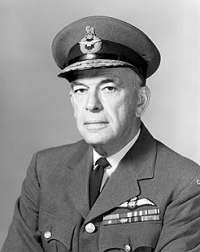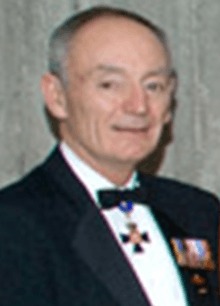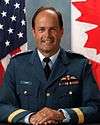Chief of the Defence Staff (Canada)
| Chief of the Defence Staff
Chef d'état-major de la défense | |
|---|---|
|
The army epaulette for the rank of general | |
| Her Majesty's Canadian Armed Forces | |
| Type | Commissioned officer |
| Status | Currently constituted |
| Abbreviation | CDS |
| Reports to | Commander-in-Chief |
| Term length | At Her Majesty's pleasure |
| Formation | 1964 |
| Deputy | Vice Chief of the Defence Staff |
| Website | http://www.cds-cemd.forces.gc.ca/ |
The Chief of the Defence Staff (CDS) (French: Chef d'état-major de la défense) is the second most senior member of the Canadian Armed Forces (after the commander-in-chief) and heads the Armed Forces Council, having primary responsibility for command, control, and administration of the forces, as well as military strategy, plans, and requirements. The position is held by a senior member of one of the three main branches of the Canadian Armed Forces. The current CDS, since 17 July 2015, is Jonathan Vance.[1]
History
Until 1964, there existed a Chief of the Naval Staff, as head of the Royal Canadian Navy; a Chief of the General Staff, as head of the Canadian Army; and a Chief of the Air Staff, as head of the Royal Canadian Air Force. A position known as the Chairman of the Chiefs of Staff Committee existed, which had a loose coordination function, although it lacked the command and control responsibilities of the later position of Chief of the Defence Staff (CDS).[2]
The position of Chairman of the Chiefs of Staff Committee and the positions of the three service chiefs were abolished in 1964 and replaced by the position of CDS. This change was based on a white paper initiated by Paul Hellyer, Minister of National Defence in the Cabinet headed by Lester B. Pearson.[3] Following the tabling of the white paper, the minister introduced legislation that took effect in August 1964. The newly established Chief of the Defence Staff was to "head all of Canada's military forces, backed by a defence headquarters that was integrated and restructured to reflect six so-called functional commands, replacing eleven former service commands. Functional described a command that was non-geographic and beyond any particular service or traditional arm."[3] In May 1967, Bill C-243 was passed by parliament and was effective as of 1 February 1968. The law dissolved the three armed services and created the Canadian Armed Forces under the command of the CDS.[4]
In 2011, the three functional commands—named Maritime Command, Land Force Command, and Air Command—had their original names reinstated, becoming once again the Royal Canadian Navy, Canadian Army, and Royal Canadian Air Force, respectively.[5]
Rank and command
The Chief of the Defence Staff follows in rank only the Commander-in-Chief of the Canadian Armed Forces, who appoints the CDS and is the person from whom the CDS receives his or her orders.[6] In practice, the commander-in-chief—the Canadian monarch, represented by the governor general—typically acts only on the advice of his or her ministers of the Crown, meaning the CDS normally reports directly to the Minister of National Defence.[6]
The CDS has been charged with four main priorities, each having multiple sub-priorities: The first is to conduct operations, which includes the successful implementation of domestic and international operations, protection of the forces through a culture of risk management, and ensuring that recruitment is at a level required to sustain the operational forces at full potential to meet their commitments.[7] Secondly, the CDS is expected to expand the regular and reserve forces to meet international and domestic obligations, which means the management of the Canadian Forces Recruiting Group so as to streamline the enlistment process of new forces members.[7] The third task is to implement the national defence strategy as outlined by the Queen-in-Council, requiring both the acquisition of new equipment and the strengthening of diplomatic relations via the United Nations, North Atlantic Treaty Organization, and North American Aerospace Defence Command."[7] Lastly, the CDS must enhance the forces' programme delivery while optimising the use of resources.[7]
The CDS is also the Chair of the Canadian Forces Decorations Advisory Committee, which reviews and recommends to the governor general members of the forces eligible to receive decorations for valour, bravery, and meritorious service, as well as Commander-in-Chief Unit Commendations.[8] This committee mirrors that for the Order of Military Merit, of which the CDS is ex-officio a member and the Principal Commander.[9] Separately, the CDS presents the Chief of the Defence Staff Commendation (French: Mention élogieuse du Chef d'état-major de la Défense)—in the form of a gold bar pin that bears three equilaterally spaced maple leaves—to recognise deeds or activities beyond the normal demands of duty,[10] as well as the Canadian Forces Medallion for Distinguished Service, which is given by the CDS on behalf of the entire forces.[11]
The CDS awards the Chief of the Defence Staff Commendation to recognise activity or service beyond regular expectations.[12][13] It can be presented to members of the Canadian Forces, civilian members of the Defence Team (in an overseas operation), and members of an allied foreign military (who's actions benefited Canada).[13] The insignia for wear has the form of a gold bar bearing three gold maple leaves and the award comes with a scroll bearing the citation.[13]
Chiefs of the Defence Staff
| Name | Rank | Image | Year | Branch | Home Province | Appointed by | Prime Minister | Notes |
|---|---|---|---|---|---|---|---|---|
| Frank Robert Miller | Air Chief Marshal[14] |  |
1964–1966 | Royal Canadian Air Force | BC | Georges Vanier | Lester B. Pearson | [15] |
| Jean-Victor Allard | General | 1966–1969 | Canadian Army | QC | Georges Vanier | Lester B. Pearson | [16] | |
| Frederick Ralph Sharp | General |  |
1969–1972 | Air Command | SK | Roland Michener | Pierre Trudeau | [17] |
| Jacques Alfred Dextraze | General | 1972–1977 | Mobile Command | QC | Jules Léger | Pierre Trudeau | [18] | |
| Robert Hilborn Falls | Admiral | 1977–1980 | Maritime Command | ON | Jules Léger | Pierre Trudeau | [19] | |
| Ramsey Muir Withers | General | 1980–1983 | Mobile Command | ON | Edward Schreyer | Pierre Trudeau | [20] | |
| Gérard Charles Édouard Thériault | General | 1983–1986 | Air Command | QC | Edward Schreyer | Pierre Trudeau | [21] | |
| Paul David Manson | General |  |
1986–1989 | Air Command | BC | Jeanne Sauvé | Brian Mulroney | [22] |
| John de Chastelain | General | 1989–1993 | Mobile Command | AB | Jeanne Sauvé | Brian Mulroney | [23] | |
| John Rogers Anderson | Admiral | 1993 | Maritime Command | BC | Ray Hnatyshyn | Jean Chrétien | [24] | |
| John de Chastelain | General | 1994–1995 | Land Force Command | AB | Ray Hnatyshyn | Jean Chrétien | [23] | |
| Joseph Édouard Jean Boyle | General | 1996 | Air Command | ON | Roméo LeBlanc | Jean Chrétien | [25] | |
| Larry Murray (Acting) | Vice-Admiral |  |
1996–1997 | Maritime Command | ON | Roméo LeBlanc | Jean Chrétien | [26] |
| Maurice Baril | General | |
1997–2001 | Land Force Command | QC | Roméo LeBlanc | Jean Chrétien | [27] |
| Raymond Henault | General |  |
2001–2005 | Air Command | MB | Adrienne Clarkson | Jean Chrétien | [28] |
| Rick Hillier | General |  |
2005–2008 | Land Force Command | NL | Adrienne Clarkson | Paul Martin | [29] |
| Walter Natynczyk | General |  |
2008–2012 | Land Force Command/Canadian Army | MB | Michaëlle Jean | Stephen Harper | [30] |
| Thomas J. Lawson | General |  |
2012–2015 | Royal Canadian Air Force | ON | David Johnston | Stephen Harper | [31] |
| Jonathan Vance | General | 2015 – Present | Canadian Army | ON | David Johnston | Stephen Harper | [32] |
See also
- Chief of the Defence Force (Australia)
- Chief of the Defence Staff (United Kingdom)
- Chairman of the Joint Chiefs of Staff
References
- ↑ Brewster, Murray (17 July 2015). "New defence chief pledges to end misconduct". CanWest. Retrieved 17 July 2015.
- ↑ Canadian Army (1949–1964), "Fonds of the Chief of the General Staff", in Department of National Defence, Histories > DHH Historical Research Centre > Research > DHH Archive Database > Reports > Miscellaneous Reports/Documents > DHH Archival Database Extract (PDF), Ottawa: Queen's Printer for Canada, p. 40, 97/10, retrieved 22 September 2009
- 1 2 Government of Canada. "Canadian Military History Gateway > Volume 3 (1872–2000) > CHAPTER 7: From Cold War to Present Day > Unification > Hellyer's Integration of the Three Services". Queen's Printer for Canada. Retrieved 27 August 2012.
- ↑ Government of Canada. "Canadian Military History Gateway > Volume 3 (1872–2000) > CHAPTER 7: From Cold War to Present Day > Unification > Implementing Unification". Queen's Printer for Canada. Retrieved 27 August 2012.
- ↑ Fitzpatrick, Meagan (16 August 2011). "Peter MacKay hails 'royal' renaming of military". CBC. Retrieved 26 September 2011.
- 1 2 Department of National Defence. "CDS Home > Responsibilities > CDS – Responsibilities". Queen's Printer for Canada. Retrieved 22 September 2009.
- 1 2 3 4 "Chief of the Defence Staff > Priorities > About the CDS – Defence Priorities for 2009–2010". Queen's Printer for Canada. Retrieved 22 September 2009.
- ↑ Department of National Defence (2007), Honours & Recognition for the Men and Women of the Canadian Forces (PDF), Ottawa: Queen's Printer for Canada, p. 105, retrieved 22 September 2009
- ↑ Office of the Governor General of Canada. "Honours > National Orders > Order of Military Merit". Queen's Printer for Canada. Retrieved 22 September 2009.
- ↑ Department of National Defence 2007, p. 66
- ↑ Department of National Defence 2007, p. 80
- ↑ Government of Canada (2013), Honours and Recognition for the Men and Women of the Canadian Armed Forces (PDF), Ottawa: Queen's Printer for Canada, p. 17, retrieved 16 November 2015
- 1 2 3 Department of National Defence. "Chief of the Defence Staff Commendation". Queen's Printer for Canada. Retrieved 18 November 2015.
- ↑ This rank was used during the 20th century existence of the Royal Canadian Air Force and replaced with the rank of general in 1968 with the unification of the Canadian Forces. See Category:Canadian Forces Air Command generals for such officers. Miller was one of only two Canadian Air Chief Marshals, the other being Lloyd Samuel Breadner
- ↑ Legault, Albert (1992). A Diplomacy of Hope: Canada and Disarmament. McGill-Queen's Press. ISBN 0-7735-0955-0.
- ↑ "General Jean-Victor Allard". Virtual Museum of Canada. Retrieved 21 March 2009.
- ↑ Preston, Richard (1991). To Serve Canada. University of Ottawa Press. ISBN 0-7766-0327-2.
- ↑ Horn, Bernd (2007). Loyal service: Perspectives on French-Canadian Military Leaders. Dundurn Press Ltd. ISBN 1-55002-693-3.
- ↑ Martell, Paul (1974). World Military Leaders. Bowker. ISBN 0-8352-0785-4.
- ↑ "General Ramsey M. Withers". Conference of Defence Associations. Archived from the original on 28 September 2007. Retrieved 21 March 2009.
- ↑ Marsh, James (2006). The Canadian Encyclopedia. Hurtig Publishers. ISBN 0-88830-330-0.
- ↑ "Gen. Paul D. MANSON". Canadian Who's Who 1997. Retrieved 21 March 2009.
- 1 2 Bernd, Horn (2001). Warrior Chiefs: Perspectives on Senior Canadian Military Leaders. Dundurn Press Ltd. ISBN 1-55002-351-9.
- ↑ "Admiral John R. ANDERSON". Canadian Who's Who 1997. Retrieved 21 March 2009.
- ↑ "General Joseph Édouard Jean BOYLE". Canadian Who's Who 1997. Retrieved 21 March 2009.
- ↑ "Vice-Admiral Larry MURRAY". Canadian Who's Who 1997. Retrieved 21 March 2009.
- ↑ "Assumption of Command of Lieutenant-General J.M.G. Baril". Governor General of Canada. Retrieved 21 March 2009.
- ↑ "NATO Biographies: Chairman of the Military Committee, General Raymond Henault". North Atlantic Treaty Organization. Retrieved 21 March 2009.
- ↑ "CBC News in Depth: Gen. Rick Hillier". CBC. 15 April 2008. Retrieved 21 March 2009.
- ↑ "New top soldier a 'gentleman's general'". Ottawa Citizen. Retrieved 21 March 2009.
- ↑ "General Thomas J. Lawson named Canada's New Chief of Defence Staff". The Globe and Mail. Retrieved 2 October 2012.
- ↑ "New defence chief pledges to stamp out sexual misconduct". Global News. Retrieved 17 July 2015.
External links
| ||||||||||||||||||||||
-2014.svg.png)